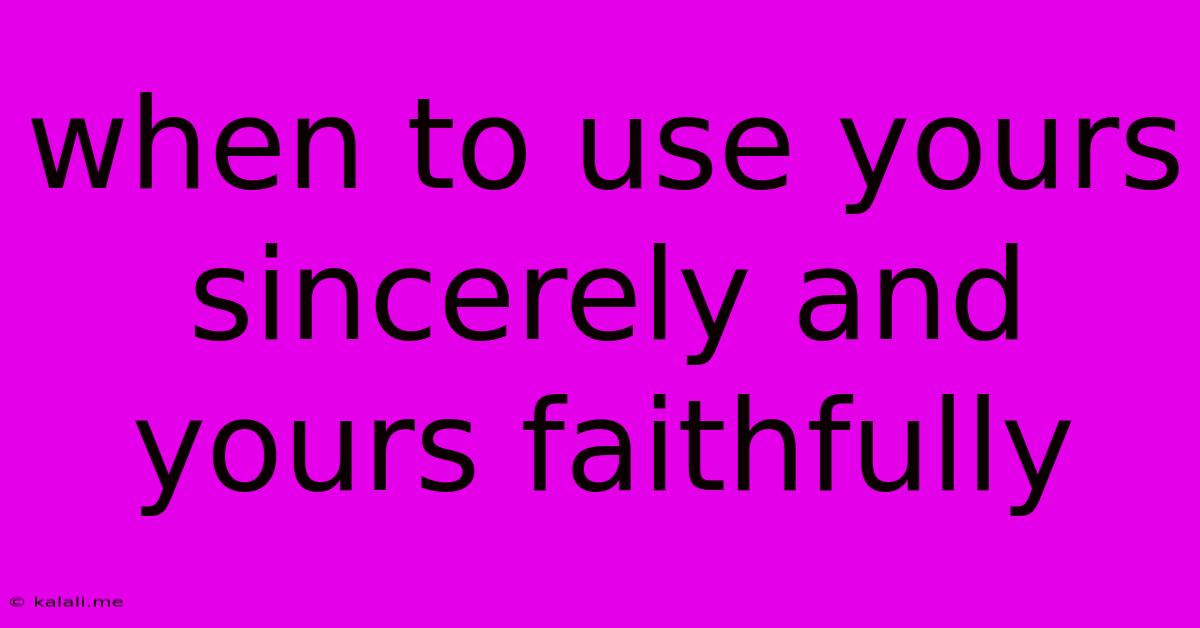When To Use Yours Sincerely And Yours Faithfully
Kalali
May 21, 2025 · 3 min read

Table of Contents
When to Use "Yours Sincerely" vs. "Yours Faithfully": A Definitive Guide
Choosing between "Yours sincerely" and "Yours faithfully" in your closing salutation can seem like a minor detail, but it actually reflects the level of formality and your relationship with the recipient. Getting it wrong can subtly undermine the professionalism of your communication. This guide will clarify when to use each, ensuring your letters and emails always leave the right impression.
Understanding the Nuances:
The choice hinges on your familiarity with the recipient. Essentially:
-
Yours sincerely: Use this when you know the recipient's name and have addressed them directly (e.g., "Dear Mr. Smith," or "Dear Sarah"). It indicates a more personal and warmer tone, suitable for someone you know or have corresponded with before.
-
Yours faithfully: Use this when you don't know the recipient's name and have used a formal salutation (e.g., "Dear Sir/Madam," or "To Whom It May Concern"). This is the more formal and distant option, reflecting a less personal relationship.
Situations Where Each Closing Is Appropriate:
Let's delve into specific scenarios to solidify your understanding:
When to Use "Yours Sincerely":
-
Cover letters: When applying for a job and you know the hiring manager's name, "Yours sincerely" is the appropriate closing. This shows a personal touch and demonstrates you've taken the time to research the company and individual.
-
Business emails: If you've previously corresponded with the recipient or have a pre-existing relationship, "Yours sincerely" is acceptable. It helps maintain a friendly yet professional tone.
-
Emails to colleagues or clients: Especially if your workplace culture is less formal, "Yours sincerely" might be a suitable choice, even for initial contact, so long as you've used their name in the opening greeting.
-
Letters to friends and family: Naturally, use "Yours sincerely" for personal correspondence.
When to Use "Yours Faithfully":
-
Formal business letters: When writing to a company or individual whose name you don't know, "Yours faithfully" is the safest and most appropriate option. This preserves formality and respect.
-
Official complaints or inquiries: When submitting a formal complaint or seeking information from an organization you're unfamiliar with, maintain a distance with "Yours faithfully."
-
Applications where the recipient's name is unknown: If you're applying for a job and don't know the hiring manager's name, "Yours faithfully" is preferable.
-
Letters to public officials: When corresponding with government officials or other public figures you're not personally acquainted with, "Yours faithfully" is appropriate.
Key Considerations:
-
Consistency is Key: Maintain consistency throughout your communication. Don't switch between "Yours sincerely" and "Yours faithfully" within the same letter or email chain.
-
Modern Business Communication: While formality is important, modern business communication is often trending towards slightly less formal closings. However, always err on the side of caution, especially in official contexts.
-
Avoid Abbreviations: Always write out "Yours sincerely" and "Yours faithfully" in full. Abbreviations can appear unprofessional.
By understanding the subtle differences between these closings and applying them correctly, you can project the right image and ensure your communications are both effective and professional. Mastering this detail will significantly elevate the quality and impact of your written correspondence.
Latest Posts
Latest Posts
-
How To Get Food Color Off Skin
May 21, 2025
-
Do Fleas Die In The Water
May 21, 2025
-
What Is Delete Key On Mac
May 21, 2025
-
It Means A Lot To Me
May 21, 2025
-
How To Wire A 2 Gang Light Switch
May 21, 2025
Related Post
Thank you for visiting our website which covers about When To Use Yours Sincerely And Yours Faithfully . We hope the information provided has been useful to you. Feel free to contact us if you have any questions or need further assistance. See you next time and don't miss to bookmark.